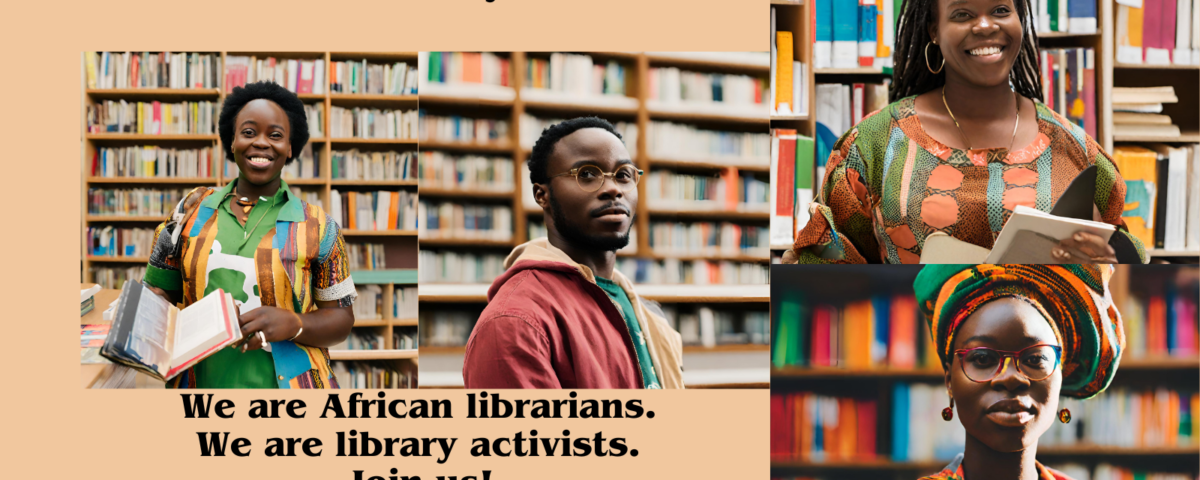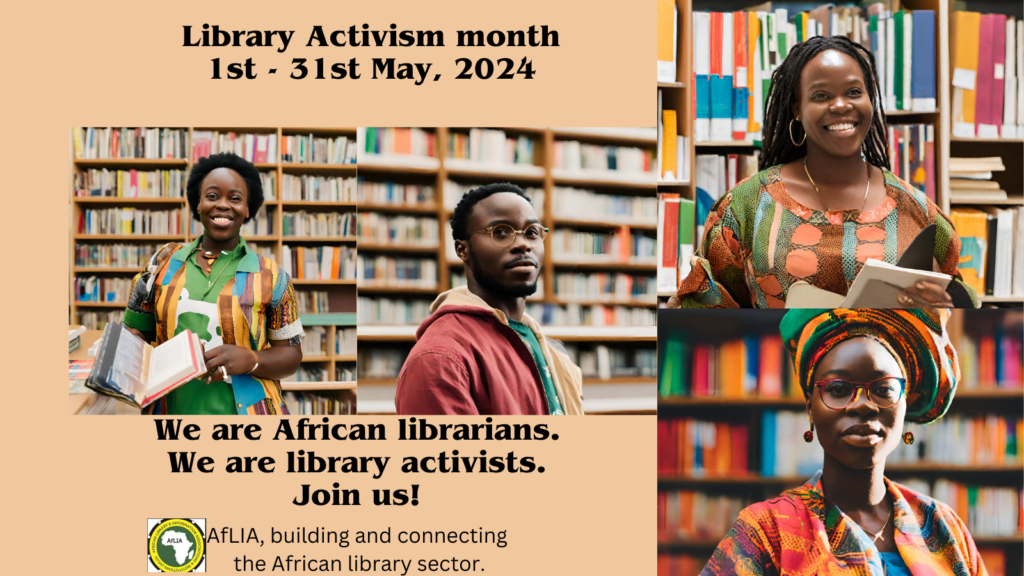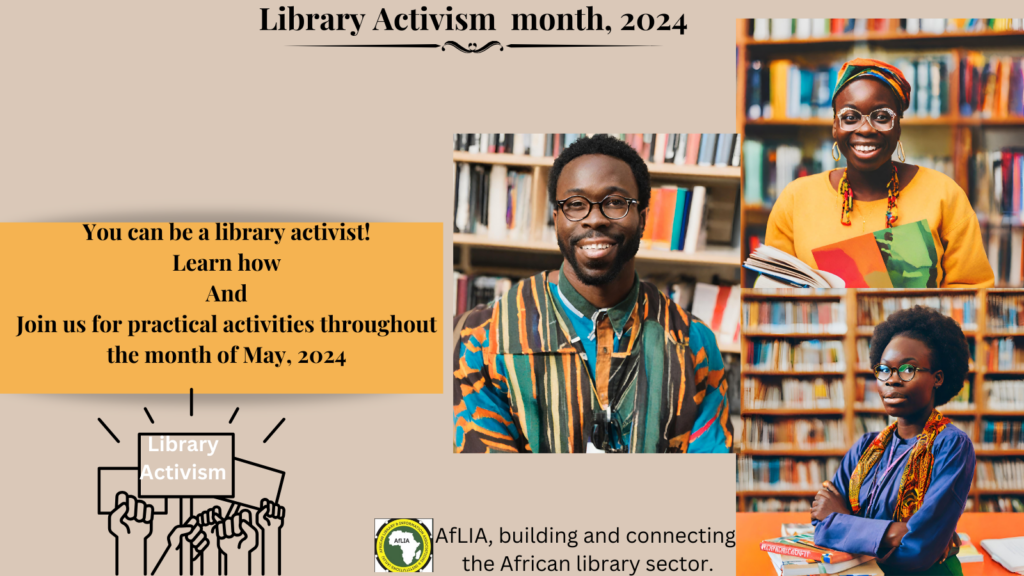2024 African Library Activism month

APRIL 10, 2024
Access to information for various purposes is arguably a cornerstone of sustainable development and a necessity for equity and justice. Nevertheless, Internet shutdowns, laws that target the robust use of social media, the spread of misinformation (gas-lighting) for purposes of influencing mindsets, fake news that is intentionally spread to deceive, knowledge behind expensive pay-walls and the perception of knowledge as a private good for pecuniary purposes are barriers to equitable access to information that can literally transform lives and communities. Sometimes, history is changed before our eyes through disinformation as untrue information is deliberately spread to whitewash situations, events and people. Throw in generative AI into the mix, and there are possibilities of ‘altered realities’ and decreasing social cohesion.
What are our roles in all these?
You and I are just librarians, and that is all!
Right?
Wrong!
Traditionally, libraries build gateways into knowledge as they collect, organize, make accessible, and preserve information materials for use. Libraries of different types have served their various user communities for ages. The raison d’être of libraries is access to knowledge and knowledge is power.
Historically, knowledge has played and continues to play crucial roles in the history and development of communities, nations and continents. From the beginning of time, knowledge has been used as a tool for influence, education, and sometimes subjugation by those who control political, economic, religious and social structures as they consciously or unconsciously determine the content, production, availability and access to information and knowledge that would be made available for public consumption. As writing became more widespread, knowledge was committed to books and other such ‘containers’. Libraries collect these knowledge ‘containers’ in different formats and allow all within their user communities to partake of the power that knowledge gives.
Thus, libraries can be viewed as institutions of power as they acquire, organize, disseminate and preserve information, knowledge and cultural heritage. Invariably, they provide opportunities for their users to build themselves up intellectually, access informed views and opinions on different subject matters, carry out research for creating more knowledge, have access to resources for quality education and lifelong learning as well as build their individual or communal cultural identity. Libraries also build social cohesion and promote social justice as they bridge gaps between the haves and have-nots when they open their doors to all within their specific user communities and allow them to access all the knowledge that is available on their shelves and/or databases.
As technology continues to evolve, great things are being enabled in the information ecosystem, yet there is a brewing disorder in the information sector that librarians can help address.
Imagine a scenario where librarians massively deploy and teaching information literacy skills to different people in their users’ communities whether they are educated or not. This would help more people detect fake news or decipher when narratives are being twisted to whitewash individuals or events or systems. Large swathes of people would know when a wrong image is used for a news item, understand what click-baits are and generally be equipped to deal with data privacy in online spaces.
Think of another scenario where librarians lead in the propagation of open licenses as a model for getting community voices to tell their stories and promote knowledge as a public good and not a privately owned resource. That way, community members can document their history and give as many people as possible access to read it using appropriate open licenses.
Also, Africans would have the leverage to access and where feasible produce life-changing knowledge in their own languages whereby farmers in Bukedi and Bugishu, Uganda who can speak and/or read Bantu and/or Lugisu (Masaba) or those in Namibia who speak Oshiwambo, or Dagbani farmers in Ghana can have resources in their own languages that can help them understand climate changes better or how to repair the water pump in the community when it malfunctions or know how to differentiate natural phenomena from superstitious beliefs etc.
Long throw?
No!
Wikimedia projects can help in this regard more than ever.
What African librarians are learning as advocates of openness will also be of great assistance in achieving this.
Librarians are used to sitting down and doing stuff (great stuff!), but times are changing!
It is time to stand up and do more! There are strong links between knowledge production, availability, access, consumption, and freedom and power for individuals or communities to realize their potentials.
Library activism is the best next step for the profession in Africa if we want to serve our user communities appropriately in these changing times, provide real value to all and effectually stamp our relevance in society.

Library Activism?
An activist is someone who speaks up and campaigns for social change because he/she understands that life could be better.
There are two main strands of library activism.
- When the library is projected as an institution of power that;
- serves as the memory and cultural identity-building establishment of a people,
- can drive change and
- lead to the transformation of lives.
- When professionals within the library sector speak up and advocate for a better information and knowledge ecosystem using their skills to make information, learning, and knowing more available and accessible.
How can we do this?
African Library and Information Associations and Institutions (AfLIA) is going to lead African librarians in celebrating a month of Library Activism in May 2024. Trainings will be run on to be a Library Activist, how to translate books and the licenses that make this doable, how to help our user communities tell their stories through words and pictures on Wikimedia projects and how African Library professionals can create brands as information managers and specialists who can lead people on how to better interact with information.
The questions then are;
- Do you believe in the library profession enough to be an activist that will promote libraries in Africa as institutions of power? Note: The burning of the Bosnia national library, University of Mosul Library and the Mosul public library Iraq are pointers to the fact that libraries are places of power that boost education, enlightenment, creativity and cultural identity (Gupta, 2018; Huseinovic and Arbutina, 2012).
- Would you want to experience the heightened relevance of libraries in Africa?
- Are you ready to learn, unlearn and relearn concepts, principles and skills in the information ecosystem?
- Do you want to see African libraries serving more of their specific user communities instead of just a few people?
- Are you keen to join librarians that push the frontiers of librarianship in Africa?
If your answer is yes to at least 4 out of the 5 questions, then you are no dinosaur! You are a change-maker, a 21st century librarian, a trailblazer and the African library sector needs you now more than ever.
Training on the following topics would run through April and May, 2024;
| SN | Topic | Date and time | Registration link |
| 1 | Being a Library activist (This will be the onboarding session for the campaign. It would set the tone for the Library activism month) | 23rd April 2024 (10am – 11:00am GMT) | DONE |
| 2 | Building a personal brand as an information specialist | 23rd April 2024 (11:00am– 12:00pm GMT) | DONE |
| 3 | Open licenses and African libraries | 26th April, 2024 (10am – 11:00am GMT) | DONE |
| 4 | Community voices and Wikimedia projects – Part 1 (Training on how to contribute to Wikipedia) | 30th April, 2024 (10am – 11:15am GMT) | DONE |
| 5 | Your library visibility on global platforms (Session will include the official launch of 2024 AfLibWk campaign) | 1st May 2024 (10am – 1pm GMT) | DONE |
| 6 | Community voices and Wikimedia projects – Part 2 (Training on how to contribute to Wikidata) | 7th May, 2024 (10am – 11:15am GMT) | DONE |
| 7 | Telling our stories: translations and Wikimedia projects (Adding knowledge in African Languages on Wikipedia) | 14th May, 2024 (10am – 11:15am GMT) | DONE |
| 8 | Community voices and Wikimedia projects – Part 3 (Training on how to contribute to WikiCommons) | 21st May, 2024 (10am – 11:15am GMT) | DONE |
| 9 | 2024 AfLibWk Office Hour | 28th May, 2024 (10am – 11:15am GMT) | CLICK TO REGISTER HERE |
NB: May, 2024 is the Library activism month and practical activities would run throughout the month. Prizes would be won. Nevertheless, terms and conditions would apply for the prizes.

